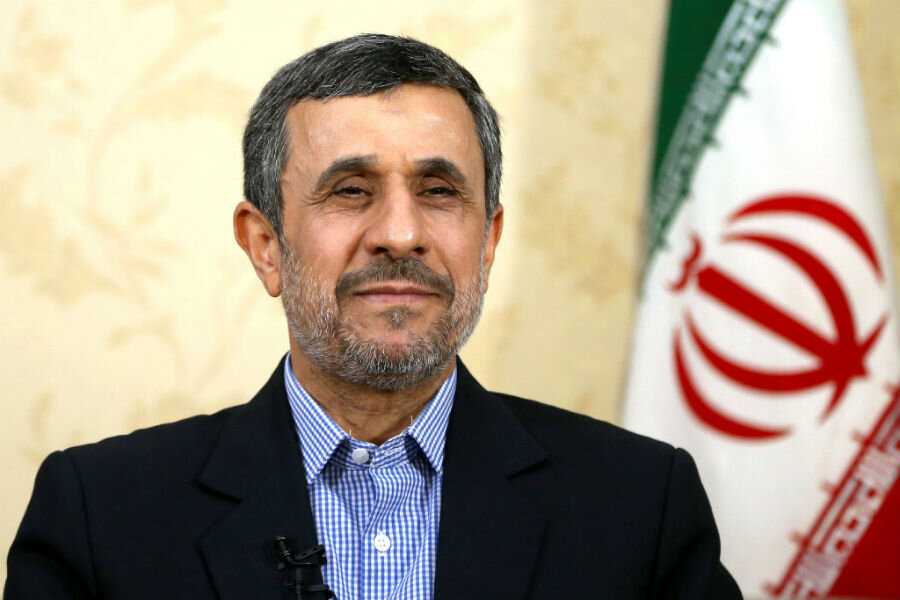Ahmadinejad disqualified from Iranian presidential election
Loading...
| Tehran, Iran
An Iranian panel charged with vetting candidates approved the country's incumbent president and five challengers but disqualified former hard-line President Mahmoud Ahmadinejad from running in next month's presidential election, state television reported Thursday.
The decision by the Guardian Council means that President Hassan Rouhani, a relative moderate, will face off against a field that includes two prominent hard-liners: Ebrahim Raisi, who is considered close to Supreme Leader Ayatollah Ali Khamenei, and Tehran Mayor Mohammad Bagher Qalibaf.
The Guardian Council, a cleric-dominated body, controls elections and must approve all laws passed by parliament. It has never allowed a woman to run for president and routinely rejects political dissidents and others calling for dramatic reform.
Other presidential candidates who made the cut, according to an Interior Ministry statement carried by state TV, include moderate Senior Vice President Eshaq Jahangiri, former conservative culture minister Mostafa Mirsalim, and former pro-reform vice president Mostafa Hashemitaba.
Mr. Ahmadinejad, who remains a deeply polarizing figure even among Iranian hard-liners, had shocked the country by registering last week. Mr. Khamenei had previously urged him not to run.
Ahmadinejad was president from 2005 to 2013, and was best known abroad for his incendiary rhetoric toward Israel, his questioning of the scale of the Holocaust and his efforts to ramp up Iran's nuclear program.
He said upon registering that he was doing so to support his former Vice President Hamid Baghaei, who also failed to receive approval to run.
"He was an unwanted guest in the election," Tehran-based political analyst Soroush Farhadi said of Ahmadinejad's disqualification. He predicted the former president would nonetheless remain politically active during the campaign to create a "quasi-opposition face for himself" for the future.
Ali Akbar Javanfekr, a close ally of Ahmadinejad, downplayed the two candidates' exclusion, saying on social media that Ahmadinejad and Mr. Baghaei had only registered out of "national, religious and revolutionary duty."
"Thank god, the Guardian Council removed the duty from their shoulders," he wrote.
More than 1,600 people registered to run for the May 19 election.
Under Iran's clerically overseen system, the president is subordinate to Khamenei, who is Iran's top decision-maker and has the final say on all matters of state. Khamenei appoints half the Guardian Council's members.
Mr. Rouhani is hoping voters will deliver him a second term to see out his promises of greater personal freedoms at home and openness to the wider world as he works to turn around Iran's sagging economy – a top priority for many voters.
The election will be in many ways a referendum on his administration's negotiation of the landmark 2015 nuclear deal with world powers. That agreement gave Iran relief from crippling economic sanctions in exchange for limits to its nuclear program, but has been assailed by hard-liners who believe Iran gave too much away in exchange for too little.
While reliable polling information is not widely available, most political observers see Rouhani as the current front-runner even though he has been unable to significantly turn around Iran's slumping economy. Every incumbent since Khamenei himself took the presidency in 1981 has won re-election.
Rouhani, though no radical, has the support of many reform-minded Iranians. Khamenei himself also might favor a second term for Rouhani despite his closeness to more hard-line candidates.
"Iranian presidents tend to become much weaker in their second terms, with a key cause being their greater susceptibility to control by the supreme leader and his institutions," Mehdi Khalaji, an Iran expert at The Washington Institute for Near East Policy, wrote this week. "This helps explain Khamenei's possible abstention from active support for the hard-line candidates."
Rouhani's toughest challenge could come from Mr. Raisi a hard-line cleric and professor of Islamic law who has promised to fight poverty and corruption if he's elected. Many hard-liners have rallied around Raisi, who got a boost last year when Khamenei appointed him head of an Islamic charity that holds extensive business interests in Iran.
He has held several judiciary positions, including serving as attorney general from 2014 to 2016, and is mentioned as a possible successor for Khamenei himself.
Adam Schreck reported from Dubai, United Arab Emirates.







